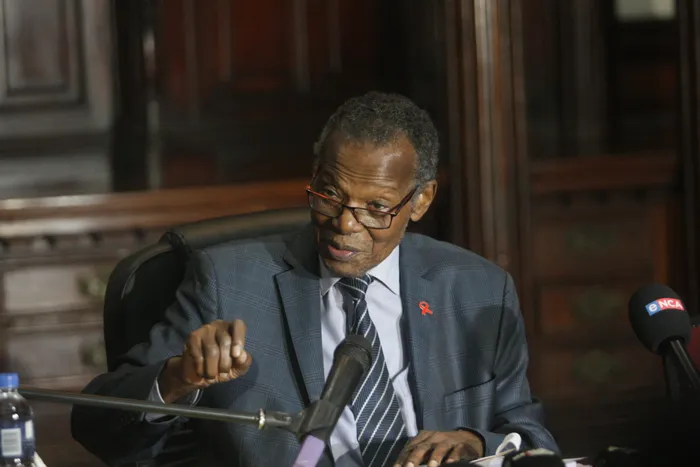Buthelezi’s complex legacy subject to emotional debate

Picture: Bongani Mbatha/African News Agency (ANA)/2021-05-11 – The complex legacy of Prince Mangosuthu Buthelezi has evoked praise from his supporters and painful memories for many thousands traumatised by the political atrocities of the 1980s and 1990s, the writer says.
By Mary De Haas
The death of Prince Mangosuthu Buthelezi has evoked a range of responses, mostly in praise of his achievements and impressive political career. However, his passing also provoked painful memories for many thousands traumatised by the political atrocities of the 1980s and 1990s.
It is not the intention here to get into details about that violence for much is on record in Truth and Reconciliation Commission (TRC) reports and other publications. It must be stressed, though, that the carnage was apartheid state sponsored, part of its Total Strategy against the liberation movements, in which homeland governments were visible fronts.
Buthelezi had been raised by his talented mother, Princess Magogo, the daughter of King Solomon, to believe his destiny lay in restoring the glory of the historic Zulu kingdom. This mission was to lead to his participation in the apartheid homeland system while, simultaneously, winning the confidence of white leadership in ‘The Last Outpost of the British Empire’, Natal. As a student at Fort Hare, Buthelezi had been a member of the ANC.
By virtue of his Buthelezi clan chiefship, he became head of the Mahlabatini Regional Authority with the implementation of the homeland policy. In 1970, he was elected chairperson of the Territorial Authority, which became KwaZulu. The young King Goodwill Zwelithini’s paternal uncle, Prince Clement kaSolomon Zulu, was elected its chief executive officer. Buthelezi steadfastly maintained that the then-banned ANC approved his participation in homeland politics.
His royal relationship was maternal, so he was not a member of the patrilineal kingly lineage. He claimed his right to be prime minister to the king through his paternal grandfather having served King Solomon, in that position. A period of struggle between Buthelezi, the young king and his paternal uncles over KwaZulu leadership followed, with Buthelezi claiming that they had to be excluded as they would be persuaded to take independence, which he refused to do. Prince Clement and others were banished, and any vestige of royal resistance ended in 1979 when, summonsed to the Legislature, King Zwelithini was humiliated, and fled the building. He was not seen in public until 1990, with Buthelezi representing him at cultural events until then.
During the 1970s Buthelezi was highly regarded in progressive white political and religious circles, his reputation enhanced by his refusal to take “independence”. However, as a Nationalist Party negotiator conceded, he was not offered much, for KwaZulu like most other homelands, was a patchwork of poverty-stricken 19th-century “native” reserves – many of which had not been part of the historic Zulu kingdom – contiguous with “white”, economically developed areas. Collaboration with Buthelezi provided a perfect opportunity for white politicians to pursue a long-term colonial goal of a different political dispensation for Natal (there had been significant opposition to joining the unitary, Afrikaner-dominated, state in 1910).
This relationship led to the establishment of the Buthelezi Commission in 1980, which produced research reports it hoped would lead to a different, power-sharing dispensation in the region. The homeland system was based on linguistic groups (local dialects were codified into languages during colonialism), and a distorted view of “culture”, derived from Scientific Racism which defines it as innate. This was a serious misuse of a concept used to describe shared and variable ideas such as norms, values and beliefs which are learnt.
Given his mission to restore the Zulu kingdom, Buthelezi used his power in then-KwaZulu and Inkatha (which he had revived) to promote a narrow, ethno-nationalist agenda, introducing a syllabus in schools teaching children they were, above all, Zulus. This politicisation of ethnicity was to lead to much political violence and deaths. The Nationalist government had noted Buthelezi’s political charisma and leadership abilities and surrounded him with its agents. Key security agency, Bureau of State Security, members played important roles in KwaZulu, and key advisers and speech writers – especially Walter Felgate – were linked to its military.
He was constantly fed stories about how the ANC had turned against him and plotted to kill him. A notorious security policeman headed the murderous KwaZulu police, and another – Phillip Powell – procured Vlakplaas weapons to train Inkatha supporters in guerilla warfare as violence escalated out of control before the April 1994 elections. The IFP (Inkatha Freedom Party) had won some concessions relating to provincial and kingly powers in negotiations and its 11th-hour entry into elections appeared linked to the establishment of the Ingonyama Trust (the KwaZulu homeland) days before the voting.
Prince Buthelezi fitted comfortably into the new Government of National Unity, but a period of extreme tension with King Zwelithini ensued, as the king reunited with his paternal uncle and placed himself above party politics. The rift was healed and, in 1999 then-president Thabo Mbeki offered Buthelezi the position of deputy president, a position he would have done well in, and boosted nation building. Regrettably, Buthelezi chose to prioritise his regional interests – leaving it to his replacement, Jacob Zuma.
Mary De Haas is a violence monitor in KZN, a honorary Research Fellow at the University of KwaZulu-Natal’s School of Law and a member of the Navi Pillay Research Group on justice and human rights